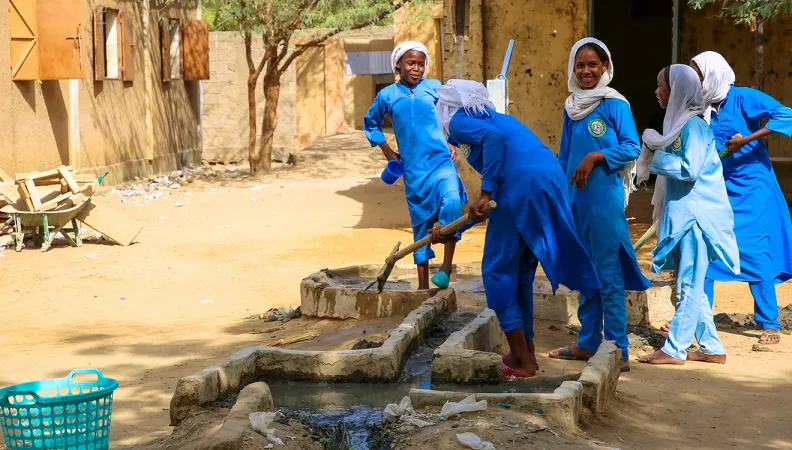Share the page
Peace-building, to Prevent and Cope with Crises
Published on

Launched in 2017, the Minka Peace and Resilience Fund is now in its fifth year of existence. Everywhere from the Sahel to the Middle East, via the Central African Republic and the Lake Chad Basin, Minka projects are being implemented to overcome crises and conflicts, in areas considered a priority for French foreign policy.
Crises appear to be proliferating, but they do not always play out in the same way. According to the Organization for Economic Co-operation and Development (OECD), in 2020, vulnerable countries were home to nearly 460 million people living in extreme poverty, i.e. nearly 80% % of the world’s total.
The types of conflict emerging today are wide-ranging: movement of populations fleeing war, territorial disputes, and conflicts resulting from climate change. The Covid-19 pandemic has only exacerbated existing problems. While there is no doubt that certain countries have been weakened economically, the social and political consequences of this health crisis will only truly be understood over time.
From emergency to long-term development
The Minka Fund aims to alleviate crises by financing appropriate development projects. In keeping with France’s foreign policy priorities, four regions have identified: the Sahel following the Malian crisis in 2012; the Central African Republic (CAR) due to the conflict in this region; the Middle East in response to the Syrian and Iraqi crises; and the Lake Chad basin, under threat from ongoing acts of violence by Boko Haram.
Read more: Karama, building towards the future in the Middle East
As a result, Minka programs tend to be concentrated in these regions. “We work according to crisis region and not by country, because crises transcend borders. We work on the determinants and consequences of the crisis itself,” says Jean-Bertrand Mothes, Head of AFD’s Fragility, Crisis and Conflict Department. “Minka is the French government’s fund for taking action before, during and after a crisis or conflict. We support projects that address these issues: preventing a crisis, mitigating its consequences, and, finally, rebuilding.”
To increase its operational efficiency, Minka has simplified procedures, through something called “instrument flexibility”, which helps save time in the preparation phase of projects.
From 2017 onwards, the Minka fund has been involved in reactivating development mechanisms in the aftermath of a crisis or conflict. Programs must also produce visible effects for the population concerned within six months, while guaranteeing long-term results. Over four years, €653 million has been pledged to 85 projects.
No one must be left behind
The aim is thus to identify the determinant factors of these crises while meeting communities’ immediate needs. Social cohesion thus plays a key role in the projects financed by the fund: developing social ties is essential in conflict situations.
“We place great emphasis on the concept of “do no harm”, and carrying out projects without prioritizing one community over another,” says Jean-Bertrand Mothes. “It’s important not to inflame existing tensions or create new ones. For example, in the Middle East, we take into account the needs of Syrian refugees, as well as those of vulnerable host populations.”
In Lebanon, for example, 2020 was a difficult year, aside from the Covid-19 health crisis. “The first country to accommodate Syrian refugees, the Land of the Cedars, had already been hit successively by economic, social, political and health crises – not to mention the catalytic effect of the explosion in the port of Beirut last August. A disaster with devastating effects that required a rapid, coordinated and sustained response.” Following the explosion, €13 million in aid was granted to help the Lebanese people.
In line with a cooperative and partnership-based approach, programs are implemented in collaboration with local governments, as well as French, local and international NGOs. In the Central African Republic, a health center was founded in Bangui through the Nengo program for women who have been victims of abuse. In coordination with the Pierre Fabre Foundation, Panzi RDC, the Dr. Denis Mukwege Foundation and the Francophone Institute for Justice and Democracy, this model is based directly on the work carried out by Dr. Mukwege. In less than a year, 29 training sessions have been organized and nearly 500 women have been treated.
Young people have not been left by the wayside either. The MédiaSahel project involves marginalized young people from the Liptako-Gourma region in the public debate. The aim is to produce various radio programs with and for young people. Close to 4,000 programs have been broadcast in ten languages by 169 radio partners.
In view of Covid-19, projects have also been adapted to ensure adequate preventive health measures are in place amid the epidemic. “In the coming years, we would like to take peace-building a step further,” says Jean-Bertrand Mothes. “By increasing coordination on the ground, our support for the socio-economic integration of young people, and our actions in the fields of gender equality, human rights and trust between the population and public institutions. Covid-19 has reaffirmed the importance of prevention and rapid action in the face of a crisis. Minka has been successful at this and will continue to leverage its ability to adapt.”
